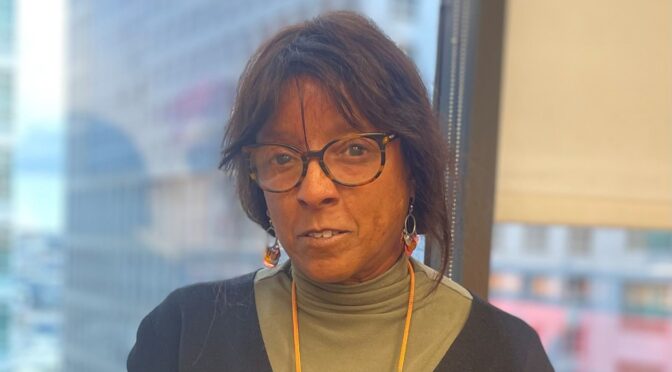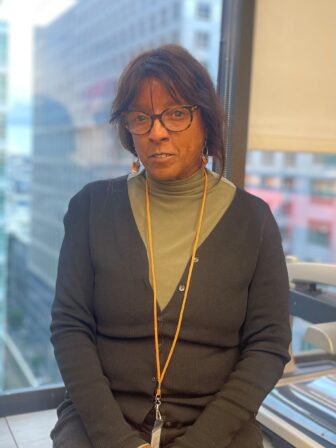During the weekend of March 30 & 31, LightHouse welcomes Dr. M. Leona Godin, a writer and performer who is blind, to lead a two-day storytelling workshop and to host our next Performance Salon.
The workshop runs from March 30 to 31 and participants will stay overnight at the LightHouse Student Residences, on the 11th floor of our San Francisco headquarters. Workshop participants will also attend the Performance Salon.
The LightHouse Performance Salon on March 30 is a Story Slam. Come and listen to live storytelling from LightHouse students or put your name in the hat for the chance to be one of ten to tell or read your five-minute narrative. Please note: The Performance Salon is open to all; you do not need to attend the Storytelling Workshop to attend the Performance Salon.
We asked LightHouse Adult Program Specialist Sabrina Bolus who is coordinating the weekend, and Leona to answer questions about their passion for writing, the Storytelling Workshop and the Performance Salon.
First up, our interview with Sabrina.
You’ve done several activities focused around writing during your time at LightHouse. Can you tell us about your interest in writing, and how and why you developed these activities for LightHouse?
Sabrina: My passion for writing dates back to 2004 when I first encountered Morning Pages while reading Julia Cameron’s book, The Artist’s Way. Cameron describes these pages as a “stream of consciousness writing, done first thing in the morning.” Writing became a sanctuary for me, a place of refuge where I could explore and express my interests, thoughts, and feelings.
Writing holds a special place in my heart, and as my vision changes, I find new ways to continue reading and writing. Collaborating with our creative students and inspiring authors reassures me that where there is a will, there is a way. I firmly believe that every dream has its moment, and by staying involved, I feel closer to understanding and realizing my writing aspirations.
What drew you to Leona Godin?
Sabrina: I became acquainted with Leona when LightHouse participants expressed interest in her book, There Plant Eyes: A Personal and Cultural History of Blindness. Leona graciously agreed to give an author’s talk, and during that event, the seed of hosting a series of writer’s workshops at the LightHouse was planted. Before I knew it, Leona played a pivotal role in bringing together a five-month writer’s series with three other esteemed authors. I am impressed by and appreciate Leona’s talent, her collaborative nature, and her desire to teach, encourage, and promote other writers.
What do you think people will get out of attending the Writer’s Weekend and/or the performance salon?
Sabrina: Attendees will engage in guided exercises, honing their skills to craft compelling personal narratives for both the page and the stage. After tuning into the Moth Storytelling Podcast, a student remarked, “I now understand why you conduct these workshops. It provides us all with a chance to tell our stories.” Her insight is spot on. Our stories are empowering, yet too often we keep them to ourselves, unaware of the strength they offer to both ourselves and others. It’s often surprising how a shared story can assist another person in navigating through both challenging and celebratory situations.
And next, our interview with Leona.
What got you interested in writing?
Leona: Reading everything I could get my hands on when I was a kid made me want to write. Things got harder when I lost my central vision. When I was a teenager, there weren’t any easy answers for visually impaired kids; it was rare to get the kind of Braille training needed to become fluent. I finally got hooked up with books on tape and then my first accessible computer. When I first saw those green letters on the black DOS minimalist screen, I thought, “Wow, I can write again!” Now it’s text-to-speech and Braille, and my life and career revolve around writing.
Are there any unique challenges that blind writers face?
Leona: Absolutely. Although so many books, magazines and literary journals are available electronically these days, we still have a long way to go. Most new books appear as eBooks as soon as they’re published, but often they are not formatted in ways that make them particularly readable with Braille displays. There is still a lot of inaccessibility in the literary world and quite a bit of snobbery with regards to eBooks. We need to remind people that eBooks are accessible books! In the professional writing world, dealing with track changes [in a Word processor] and other editing tools can present problems for our assistive technology, which is not always fully compatible.
Probably the biggest challenges we face are cultural; so many depictions of blind people—in novels, movies, articles—are written by sighted people. And we all know how wrong sighted people usually are about blind stuff! I write in my book, There Plant Eyes: A Personal and Cultural History of Blindness, about how even professional authors struggle with publishers to tell authentic stories that contradict the stories that have been told of us for so long. Finally, as disabled people, we are not yet always mentioned in statements of diversity at literary magazines, grants and fellowships and other cultural institutions that are in place to lift up other traditionally marginalized writers.
What do you hope people attending the Storytelling Workshop will get from the weekend?
Leona: I hope participants will gain confidence in their writing, feel a sense of a writing community, and sketch out a path forward with respect to personal or professional writing goals. Plus, I hope they have fun!
What about the Performance Salon?
Leona: The Salon is a chance to practice performing in front of an audience. Much of writing is a solitary endeavor. Going to readings, storytelling slams, and other writerly events is a great way to test out new work and make new friends.
What advice would you give to aspiring writers?
Leona: Write a lot and read more!
Now for the details about the two-day Storytelling Workshop and the Performance Salon.
What: Two-Day Storytelling Workshop with Author M. Leona Godin
When: Saturday, March 30 beginning at 10:00 am through Sunday, March 31 ending at 1:00 pm
Where: LightHouse San Francisco headquarters at 1115 Market St.
Cost: $100
Description: During this intensive weekend workshop, writer and performer Leona Godin will guide students through writing and performance exercises to craft personal narratives. We’ll consider creative non-fiction for the page and for the stage, for example the personal essay, Moth-style storytelling, and memoir. Students will also be encouraged to prepare a short piece for performance during the public story slam Saturday afternoon. Read a detailed schedule for the Storytelling Workshop.
RSVP: RSVP online for Two-Day Storytelling Workshop with Author M. Leona Godin or to Sabrina Bolus at SBolus@lighthouse-sf.org or 415-694-7607.
What: 1155 Performance Salon
When: Saturday March 30, from 4:00 pm to 6:00 pm
Where: LightHouse San Francisco headquarters at 1115 Market St., 10th floor
Description: Experience the thrill of live storytelling at our upcoming Story Slam hosted by Leona Godin and featuring … you! Just put your name in the hat for a chance to tell (or read) a five-minute story. Each storyteller will have five minutes to share their narrative, crafted around a theme specially chosen for the event. With ten coveted performance slots available, five will be drawn from our exclusive weekend storytelling workshop with Leona Godin.
Theme: “Food”: Everybody has to eat, right? Come share a five-minute story about breaking bread, cooking grandma’s recipes, or growing vegetables in your garden. Bring your tales about food from around the dinner table, the grocery store, or the world. Hilarious kitchen escapades and emotional family feasts are welcome, as are food issues, food phobias, and food revelations. The theme is provided to spark your imagination, but if you prefer to tell a story about something else, that’s ok, too!
RSVP: RSVP to Maia Scott at MScott@lighthouse-sf.org or 415-694-7608.



 Last year, LightHouse welcomed a new member to our Community Services Department, Sabrina Bolus. Sabrina took on the role of Adult Programs Coordinator and hit the ground running! Many of our students know Sabrina as the creator and hostess of weekly programs like Gratitude VIBES, Vision: Peer-Led Support Group and Toastmasters, as well as monthly virtual book clubs and writers workshops—but did you know Sabrina started out as a LightHouse student herself? Read all about Sabrina’s first-hand experience in the Employment Immersion program. (And don’t forget to join her incredible programs! You can see a full list of LightHouse offerings on our
Last year, LightHouse welcomed a new member to our Community Services Department, Sabrina Bolus. Sabrina took on the role of Adult Programs Coordinator and hit the ground running! Many of our students know Sabrina as the creator and hostess of weekly programs like Gratitude VIBES, Vision: Peer-Led Support Group and Toastmasters, as well as monthly virtual book clubs and writers workshops—but did you know Sabrina started out as a LightHouse student herself? Read all about Sabrina’s first-hand experience in the Employment Immersion program. (And don’t forget to join her incredible programs! You can see a full list of LightHouse offerings on our